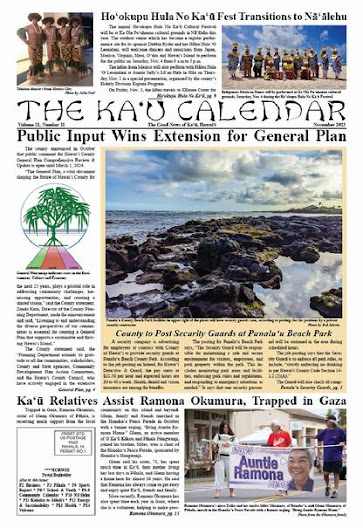| Image may be NSFW. Clik here to view.  |
| Eucalyptus that was piled up years ago above Pāhalato haul and burn in Hū Honua's biofuel plant, which hasn't opened north of Hilo. Hū Honua is suing Hawaiian Electric, claiming the utility is responsible for the biofuel plant remaining idol. Photo by Julia Neal |
Hū Honua also states that feedstock for its biomass power plant would include woody invasive species. It contends that its "productive use of such overgrown and invasive species would benefit the environment
and mitigate well-documented wildfire risks presented by such overgrowth."
| Image may be NSFW. Clik here to view.  |
| Life of the Land opposes Hu Honua's efforts to burn wood to make electricity. |
and mitigate well-documented wildfire risks presented by such overgrowth."
Hū Honua's plans were earlier rejected by the Hawai'i Supreme Court and opposed by Life of the Land. Arguments included cost of electricity from cutting trees, hauling and burning them being more expensive than solar, wind, geothermal and hydroelectric. Other arguments included the environmental impact of hauling the logs long distance, and pollution from burning it at the factory on the coast.
Hū Honua argued that its method of energy production is "firm" and needed in the island's energy portfolio and that burning trees is not subject to variables of sun, wind, river flow and geothermal to make electricity.
In its latest filing, Hū Honua contends that Hawaiian Electric violates antitrust laws with a monopoly that has caused direct harm to Hu Honua and Hawai'i Island residents, who have been plagued by increasingly higher rates and grid reliability issues. It accuses Hawaiian Electric “with shameless arrogance and disregard not just for competition, but for the people, economy, and environment of Hawai'i Island.”
| Image may be NSFW. Clik here to view.  |
| Hu Honua is suing Hawaiian Electric, asking for $1 billion. |
Hū Honua asks U.S. District Court to "end to all monopolistic conduct and requests the Court award it more than $1 billion in antitrust damages." Hū Honua also requests that "Hawaiian Electric be ordered to transfer its Hamakua power plant, a facility Hawaiian Electric acquired via a 'straw purchase' scheme, to an independent owner to restore competition for the benefit of Hawai'i Island ratepayers. This 'straw purchase' was designed to obscure Hawaiian Electric’s controlling interest after state regulators had denied its previous bid to acquire Hamakua," says the statement from Hū Honua.
KAʻŪ RURAL HEALTH COMMUNITY ASSOCIATION CELEBRATED ITS 25TH ANNIVERSARY on Saturday, with a program on the heritage of Kaʻū communities. Held at Pāhala Community Center, it included dance, music and food of people who migrated here, from Polynesians who became Hawaiians to Chinese, Japanese, Okinawan, Filipino, Korean, and Portuguese to Latin American immigrants who come here to work in agriculture.
Mayor Mitch Roth honored Marques with a certificate of appreciation. He recalled being involved with the organization at the time of its founding and praised Marques for the many years of hard work to build Kaʻū Rural Health Community Association to provide its services to the community.
Daniel G. Swanson of Gibson, Dunn & Crutcher LLP, attorney for Hū Honua, said, “Hū Honua’s newly constructed facility would bring reliable, renewable energy to Hawai'i Island at a competitive price, but sits idle today solely due to Hawaiian Electric’s predatory and anticompetitive conduct, which it has ruthlessly wielded to entrench and expand its monopoly over Hawai'i’s power sector.”
The statement says that Hawai'i residents "already face the highest average electricity prices by far in the
United States—nearly three times the U.S. average price—due to costly imported petroleum products being burned in Hawaiian Electric’s aging and increasingly unreliable power generation facilities, whose costly operation continues to be extended and protected by Hawaiian Electric’s monopoly."
Hū Honua contends that by keeping Hu Honua out of the market and acquiring the largest independent power plant on Hawai'i Island in 2017, "Hawaiian Electric has cornered more than 90 percent and at times nearly 100 percent of all firm power generation capacity on the Island. Since 2017, ratepayers have seen their electric rates skyrocket by 50-100 percent or more while energy reserve margins have deteriorated, and the risk of power outages has increased. Hawai'i Island residents have been instructed at least nine times between August 2022 and March 2023 to reduce power consumption during peak hours."
The statement says that Hawai'i residents "already face the highest average electricity prices by far in the
| Image may be NSFW. Clik here to view.  |
| Hu Honua lost in the Hawai'i Supreme Court and is seeking relief in federal court. |
Hū Honua contends that by keeping Hu Honua out of the market and acquiring the largest independent power plant on Hawai'i Island in 2017, "Hawaiian Electric has cornered more than 90 percent and at times nearly 100 percent of all firm power generation capacity on the Island. Since 2017, ratepayers have seen their electric rates skyrocket by 50-100 percent or more while energy reserve margins have deteriorated, and the risk of power outages has increased. Hawai'i Island residents have been instructed at least nine times between August 2022 and March 2023 to reduce power consumption during peak hours."
Hawaiian Electric and Life of the Land have not yet responded or commented on Hū Honua's latest federal court filing.
To read comments, add your own, and like this story, see facebook.com/kaucalendar. See latest print edition at kaucalendar.com, in the mail and on stands.
| Image may be NSFW. Clik here to view.  |
| Hawaiian was the first cultural component of Kaʻū presented at the Rural Health Community Association's 25th anniversary. Photo by Julia Neal |
National anthems from the homelands were played before short histories and presentations of traditional dress, dance and music were given. Decorations featured the checkered palaka table cloths in red and white and blue and white, and centerpieces with flags of homeland countries pinned into peeled banana stalks. The cultural presentation was produced by Sophia Hanoa and Kaʻū Advisory Council, led by Kupuna Jessie Ke.
The celebration also honored founder and Executive Director of Kaʻū Rural Health Community Association Jessie Marques, who is instrumental in numerous health initiatives, from Kaʻū Hospital being federally designated as a critical care facility to organizing Certified Nursing Assistant education and research on lung health during times of volcanic activity. The organization has also been active in promoting and cosponsoring vaccination drives during the COVID pandemic and into the future. Many of its youth members have developed careers in health.
| Image may be NSFW. Clik here to view.  |
| Keiki wore the traditional dress of the many peoples who make up Kaʻū, including the Portuguese. Photo by Julia Neal |
| Image may be NSFW. Clik here to view. .jpg) |
| Mayor Mitch Roth and Kaʻū Rural Health Community Association founder and Executive Director Jessie Marques at the 25th Anniversary celebration. Photo by Julia Neal |
Numerous current and former board members and other supporters were acknowledged, including CU Hawai'i federal credit union, which gave Kaʻū Rural Health Community Association $3,000 earlier this year.
The celebration wrapped up with food sampling from the cultures that make up Kaʻū and with a Taiko drumming group that invited the audience to participate.
To read comments, add your own, and like this story, see facebook.com/kaucalendar. See latest print edition at kaucalendar.com, in the mail and on stands.
FENTANYL ARREST MONTHLY UPDATE has been released by Hawai'i Police Department. HPD provides monthly updates on number of fentanyl related arrests (possession/distribution) in Hawai‘i County and quantity of fentanyl recovered for preceding month.
During month of October, there were three fentanyl related arrests, three in East Hawai‘i and zero in West Hawai‘i. Police recovered 43.69 grams of illicit fentanyl last month, 1.79 grams in East Hawai'i and 41.9 grams West Hawai'i. HPD recovered 312 fentanyl pills, with zero in East Hawai'i and 312 in West Hawai'i.
An HPD statement says, "Hawai‘i Police Department is committed to fighting drugs on island and apprehending those that distribute and sell illegal narcotics. In recent years, the use of illicit fentanyl has reached epidemic proportions on the mainland and Hawai‘i. Criminal drug networks are mixing this dangerous synthetic opioid into illegal counterfeit pills and selling them as legitimate prescription pills, often with deadly consequences."
During month of October, there were three fentanyl related arrests, three in East Hawai‘i and zero in West Hawai‘i. Police recovered 43.69 grams of illicit fentanyl last month, 1.79 grams in East Hawai'i and 41.9 grams West Hawai'i. HPD recovered 312 fentanyl pills, with zero in East Hawai'i and 312 in West Hawai'i.
An HPD statement says, "Hawai‘i Police Department is committed to fighting drugs on island and apprehending those that distribute and sell illegal narcotics. In recent years, the use of illicit fentanyl has reached epidemic proportions on the mainland and Hawai‘i. Criminal drug networks are mixing this dangerous synthetic opioid into illegal counterfeit pills and selling them as legitimate prescription pills, often with deadly consequences."
HPD's Fentanyl safety tips: To learn how to recognize fentanyl poisoning, and more, go to HPD’s website: https://www.hawaiipolice.com/services/crime-tips#fentanyl.
Have a drug tip? Information relating to illicit drug use and distribution, as well as vice issues such as prostitution, gambling, and other related crimes can be provided to Vice Sections 24-hour anonymous vice/drug tip hotline at (808) 329-“ZERO-ICE” (808) 329-0423 for Kaʻū, Kona, South Kohala, and North Kohala and to (808) 934-“VICE” (808) 934-8423 for Puna, South Hilo, North Hilo, and Hāmākua.
How does the hotline work? Callers will be asked to provide information, but not name, address or telephone number. All information is kept confidential and within the Criminal Investigation Division.
What happens to info? Information is cross-referenced, allowing detectives to determine if additional information related to the criminal activity about which you are calling has been reported in the past. Even “small” bits of information can at times provide detectives with the “missing link” that allows them to take action.
Have a drug tip? Information relating to illicit drug use and distribution, as well as vice issues such as prostitution, gambling, and other related crimes can be provided to Vice Sections 24-hour anonymous vice/drug tip hotline at (808) 329-“ZERO-ICE” (808) 329-0423 for Kaʻū, Kona, South Kohala, and North Kohala and to (808) 934-“VICE” (808) 934-8423 for Puna, South Hilo, North Hilo, and Hāmākua.
How does the hotline work? Callers will be asked to provide information, but not name, address or telephone number. All information is kept confidential and within the Criminal Investigation Division.
What happens to info? Information is cross-referenced, allowing detectives to determine if additional information related to the criminal activity about which you are calling has been reported in the past. Even “small” bits of information can at times provide detectives with the “missing link” that allows them to take action.
To read comments, add your own, and like this story, see facebook.com/kaucalendar. See latest print edition at kaucalendar.com, in the mail and on stands.
| Image may be NSFW. Clik here to view.  |
| 7,500 printed, 5,000 in the mail |

%20copy.jpg)
.JPG)




.png)